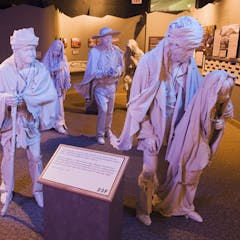
Articles on Andrew Jackson
Displaying 1 - 20 of 25 articles

Years of research about the people who work in the federal government finds that most of them are devoted civil servants who are committed to civic duty without regard to partisan politics.

Canada relies on established norms, rules and institutions to make the world stable. These concepts would be a great risk if Donald Trump made good on threats to disregard NATO.

Is American democracy an ‘experiment’ in the bubbling-beakers-in-a-laboratory sense of the word? If so, what is the experiment attempting to prove, and how will we know if and when it has succeeded?

The right is explicitly laid out in the same treaty that led to the Trail of Tears.

Only one president has done so – Franklin Delano Roosevelt – but others considered it, and even tried.

A president’s persona is always a public act. In that way, Trump’s shtick – vulgar man of the people – was not exceptional. And every president has had to invent his version of the role.

‘Mind your manners’ isn’t just something your mother told you. Manners – and civility – are an essential component of how things get done in government, and the Founding Fathers knew it.

For decades, presidents beginning with Andrew Jackson routinely replaced large swaths of the government workforce, often requiring them to pay fees to political parties in exchange for their jobs.

For decades, presidents routinely replaced large swaths of the government workforce, often requiring them to pay fees to political parties in exchange for their jobs.

‘Mind your manners’ isn’t just something your mother told you. Manners – and civility – are an essential component of how things get done in government, and the Founding Fathers knew it.

Five of the six disputed presidential elections in US history were resolved and the country moved on – but one ended in civil war. What will happen if the 2020 election is contested?

The U.S. presidential election is again serving as a symptom and a symbol of a troubled society. Whatever the outcome, history suggests anything but a quick resolution to deeply rooted problems.

The technical qualifications for presidential candidates are the same, but how people seek the nation’s highest office has shifted over the centuries.

Five of the six contested presidential elections in U.S. history were resolved and the country moved on – one ended in civil war. What will happen if the upcoming election is contested?

The framers of the Constitution never mentioned a right to vote. They didn’t forget. They intentionally left it out.

Lincoln’s chances of reelection in 1864 were dim. He was presiding over a bloody civil war, and the public was losing confidence in him. But he steadfastly rejected pleas to postpone the election.

Could defiance of court orders at the highest level undermine the Constitution’s authority in the eyes of American citizens?

For more than two centuries, one particular epithet has resonated through US politics – and even helped inspire the unofficial mascot of a major political party.

When the electoral process was helped along by practices that either were or appeared to be underhanded, the resulting wounds took a long time to heal – and may not ever have healed.

President Trump hinted that he would defy a Supreme Court ruling recently, though he later yielded to its authority. Andrew Jackson – Trump’s hero – likewise challenged the rule of law in the 1830s.





